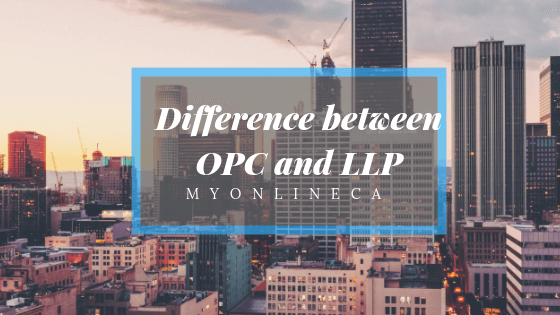Registration of your company is the firsts step for your new business. If you are confused between One Person Company (OPC) and Limited Liability Partnership (LLP) then read this article. You can form your own company as One Person Company if you are the only person in your company. You can form your own Limited Liability Partnership which requires minimum 2 people.
One Person Company is governed by Companies act and LLP governed by the Limited Liability Partnership Act. This article talks about Feature, Advantages of OPC and LLP and also talk about the difference between OPC and LLP so you will be able to find that where you want to register your business.
Features of OPC and LLP
| OPC | LLP |
| 1. Only One person required for incorporation
2. OPC incorporated aa s Private company 3. One Person Company need not to hold any AGM (Annual General Meeting) in each year 4. Limited Liability 5. Separate legal entity 6. can appoint a maximum of 15 directors, but minimum should be one director |
1. LLP is a separate legal entity from its partners.
2. Rights and Duties of Partners governed by the LLP agreement.
3. Partners Liability is limited
4. No partner is liable on account of the independent or unauthorized action of other partners or for their misconduct.
5. Two partners Required for LLP
|
Difference Between OPC and LLP
Differences between OPC and LLP is given below
| S.no | Particulars | One Person Company | Limited Liability Partnership |
| 1 | Governed by | Companies Act, 2013 | Limited Liability Partnership Act |
| 2 | Incorporation Documents | Memorandum of Association and Article of Association | LLP Agreement |
| 3 | Members/Partners | Only One person required | Minimum 2 Person required |
| 4 | Account and Audit | Maintenance of accounts is Compulsory and Audit if applicable | Accounts are required to be audited if the turnover exceeds Rs.40 Lakhs or contribution exceeds Rs.25 Lakhs. |
| 5 | Liability | Limited to capital | Limited to Capital contribution |
| 6 | Annual Return | Filing of Financials and Annual returns is compulsory, within 180 days from the date of closure of financial year. | Filing of Annual Return is compulsory within 60 days from the close of the Financial Year.
|
| 7 | Directors | Minimum 1 and maximum 15 director | Minimum 2 partners required |
| 8 | Director Identification Number (DIN) | DIN required before appointed as Director | DPIN required before appointing as Partner |
As you can see in the above table that there are so many differences between OPC and LLP. Both are governed by different rules and regulation. Incorporation of business under these are different.
But it has one similarity that both are can be formed easily because there is no such requirement for both. And after incorporation, both do not require many compliances.
Advantages of OPC and LLP
| OPC | LLP |
| 1. A process of Forming is easy
2. Only One person required for incorporation 3. The financial statements of one person company can be signed by one director alone. 4. Limited liability 5. Complete control of the company 6. You can get a loan from banks easily 7. Easy to manage |
1. A process of forming is easy
2. Perpetual Succession 3. Limited Liability 4. No restriction on joining and leaving of LLP 5. Easy transferability of ownership 6. Tax rates are low for an LLP as compared to Company 7. No compulsory audit required except it turnover exceeds Rs.40 lakhs and where the contribution exceeds Rs 25 lakhs |
Conclusion for Difference Between OPC and LLP
All said and done, after reading this article you can decide now, where you want to register your business. As you can see in this article that there is a difference between LLP and OPC. Both are governed by different rules and regulations. As you know now that minimum requirement of a member in OPC is only one whereas in LLP is 2 members required for incorporation.
Registration of both is mandatory, you should register your business in one of these.

